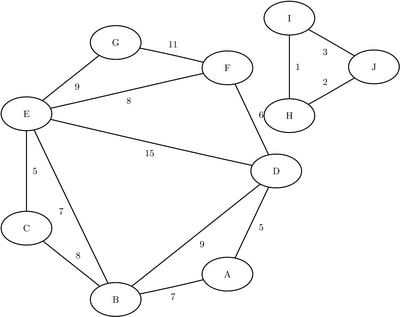The OPTNET Procedure
- Overview
-
Getting Started

-
Syntax
 Functional SummaryPROC OPTNET StatementBICONCOMP StatementCLIQUE StatementCONCOMP StatementCYCLE StatementDATA_ADJ_MATRIX_VAR StatementDATA_LINKS_VAR StatementDATA_MATRIX_VAR StatementDATA_NODES_VAR StatementLINEAR_ASSIGNMENT StatementMINCOSTFLOW StatementMINCUT StatementMINSPANTREE StatementSHORTPATH StatementTRANSITIVE_CLOSURE StatementTSP Statement
Functional SummaryPROC OPTNET StatementBICONCOMP StatementCLIQUE StatementCONCOMP StatementCYCLE StatementDATA_ADJ_MATRIX_VAR StatementDATA_LINKS_VAR StatementDATA_MATRIX_VAR StatementDATA_NODES_VAR StatementLINEAR_ASSIGNMENT StatementMINCOSTFLOW StatementMINCUT StatementMINSPANTREE StatementSHORTPATH StatementTRANSITIVE_CLOSURE StatementTSP Statement -
Details

-
Examples
 Articulation Points in a Terrorist NetworkCycle Detection for Kidney Donor ExchangeLinear Assignment Problem for Minimizing Swim TimesLinear Assignment Problem, Sparse Format versus Dense FormatMinimum Spanning Tree for Computer Network TopologyTransitive Closure for Identification of Circular Dependencies in a Bug Tracking SystemTraveling Salesman Tour through US Capital Cities
Articulation Points in a Terrorist NetworkCycle Detection for Kidney Donor ExchangeLinear Assignment Problem for Minimizing Swim TimesLinear Assignment Problem, Sparse Format versus Dense FormatMinimum Spanning Tree for Computer Network TopologyTransitive Closure for Identification of Circular Dependencies in a Bug Tracking SystemTraveling Salesman Tour through US Capital Cities - References
Minimum Spanning Tree
A spanning tree of a connected undirected graph is a subgraph that is a tree that connects all the nodes together. Given weights on the links, a minimum spanning tree (MST) is a spanning tree whose weight is less than or equal to the weight of every other spanning tree. More generally, any undirected graph (not necessarily connected) has a minimum spanning forest, which is a union of minimum spanning trees of its connected components.
In PROC OPTNET, the minimum spanning tree algorithm can be invoked by using the MINSPANTREE statement. The options for this statement are described in the section MINSPANTREE Statement. This algorithm can be used only on undirected graphs.
The resulting minimum spanning tree is given in the output data set that is specified in the OUT= option in the MINSPANTREE statement.
The minimum spanning tree algorithm reports status information in a macro variable called _OROPTNET_MST_. See the section Macro Variable _OROPTNET_MST_ for more information about this macro variable.
PROC OPTNET uses Kruskal’s algorithm (Kruskal 1956) to compute the minimum spanning tree. This algorithm runs in time ![]() and therefore should scale to very large graphs.
and therefore should scale to very large graphs.
Minimum Spanning Tree for a Simple Undirected Graph
As a simple example, consider the weighted undirected graph in Figure 2.39.
Figure 2.39: A Simple Undirected Graph

The links data set can be represented as follows:
data LinkSetIn; input from $ to $ weight @@; datalines; A B 7 A D 5 B C 8 B D 9 B E 7 C E 5 D E 15 D F 6 E F 8 E G 9 F G 11 H I 1 I J 3 H J 2 ;
The following statements calculate a minimum spanning forest and output the results in the data set MinSpanForest:
proc optnet
data_links = LinkSetIn;
minspantree
out = MinSpanForest;
run;
The data set MinSpanForest now contains the links that belong to a minimum spanning forest, which is shown in Figure 2.40.
Figure 2.40: Minimum Spanning Forest
| from | to | weight |
|---|---|---|
| H | I | 1 |
| H | J | 2 |
| C | E | 5 |
| A | D | 5 |
| D | F | 6 |
| B | E | 7 |
| A | B | 7 |
| E | G | 9 |
| 42 |
The minimal cost links are shown in green in Figure 2.41.
Figure 2.41: Minimum Spanning Forest

For a more detailed example, see Example 2.5.